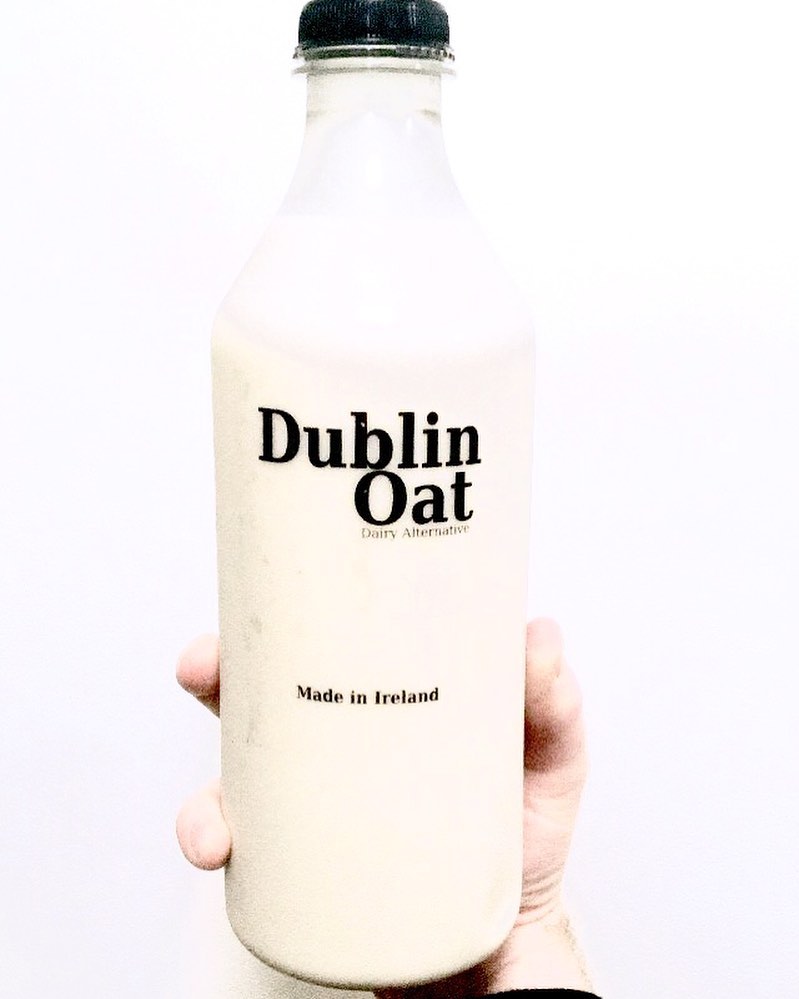What’s the skinny on the Dublin Oat company
 @dublinoat_
@dublinoat_
What’s the skinny on the Dublin Oat company
By Emily Mullen
We chat to co-founder Stephen O’Loughlin about Dublin Oat’s newly fixed foothold in the Dublin cafe scene
Anyone who has attempted to make oat milk at home knows it is a futile and messy process, that invariably results in soapy-looking water and handfuls of chalky porridge, no matter how many eco food blogger videos you watch or bits of cheesecloth you go through. With one ear on the ground listening to these futile exercises and an eye on the global market growth (which is projected to reach $995.3 Million by 2027) production and producers of the milk alternative have increased. Since oat milk became “mainstream” which has been widely credited to the UK and US shortage of the stuff in 2018, brands like Oatly, Innocent, Alpro, Flahavan’s, and Bunalan have become mainstays on the shelves of many supermarkets.
While many of these brands have released “barista” versions, a cult cafe oat milk has yet to be established. Joining the fray is Dublin Oat, a small-scale company producing out in Ballyboughal, in County Dublin. New to the market, you might have noticed its distinct logo cropping up in cafes around Dublin, places like Marlowe And Co, It’s a Trap, F I A, Bear Market Coffee, Urban Health, the number growing by the day.
Like a lot of good things, it’s the brainchild of a barista and a chef. The idea came nearly three years ago when Stephen O’Loughlin was working as a barista next door to Sussex Terrace’s Forest Avenue Restaurant and was discussing the drink with restaurant owner Sandy Wyer. “We were discussing how we have amazing oats here in Ireland and we were still importing our oat drinks and it just seemed absolutely mad to us,” O’Loughlin told us. “So we started working on recipes to find the right balance of sweetness and creaminess and that was a long process it is a lot more difficult to make than we first anticipated! I honestly thought some oats water and a blender was all we would need to begin with but the process is a lot more involved!”
The product had a bumpy start, with a failed launch that happened in March 2020, just a few days before the first lockdown. “We had done our first proper full commercial production batch and then all of a sudden we had no coffee shops or restaurants open and shops were really reluctant to take on a new product in those early days of the pandemic,” O’Loughlin said that the problems seemed to mount when their rented production facility closed down. It took Dublin Oat a year to find a new facility and to kick production off once more.
While O’Loughlin was understandably coy about giving away too much of the production process (“to the grave, it goes with me”), he did illustrate the differences between Dublin Oat and its competitors, “we don’t do long-life UHT treatment or homogenise so it is a fresh product and needs to be kept in the fridge. But it really does taste crazy fresh and creamy because of that.”
One of the marked differences is the high oat content, with each bottle roughly hitting the 10% mark, Dublin Oat outranks the other oat drinks on the market. The company also works with gluten-free oats from a couple of co-ops around the country, “They are certified as gluten-free and they have the crossed grain trademark from the Coeliac Society of Ireland to endorse their gluten-free status, and there is no gluten or other allergens in the production facility. We use the barra variety of oat which sequester a lot of carbon from the environment but are also slightly plumper and have a little bit more fat content so make the drink super creamy,” O’Loughlin added.
After a false start last year Dublin Oat does seem to have relaunched at a good time, placing its bottles alongside busy baristas’ hands in the thriving cafe scene and onto the shelves of shops thronging with customers keen to support indigenous Irish producers. “We have thankfully started well” O’Loughlin admitted, “It’s definitely a relief to get up and running!”. Running it is, after a rocky start, the product is certainly flying, stocklists seem to be doubling by the day, Dublin Oat appears to be becoming Dublin cafes’ go-to oat milk.
Follow Dublin Oat on Instagram.
Elsewhere on District: South Anne Street and other city center streets will become permanently pedestrianised
